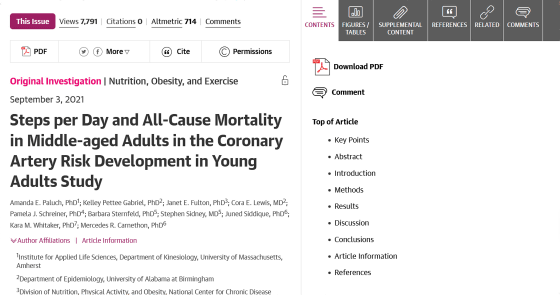Research results show that there is a high possibility of living longer from '7,000 steps' instead of '10,000 steps a day'

Walking is said to be effective in improving health, and research results have shown that 'the
Steps per Day and All-Cause Mortality in Middle-aged Adults in the Coronary Artery Risk Development in Young Adults Study | Lifestyle Behaviors | JAMA Network Open | JAMA Network
https://jamanetwork.com/journals/jamanetworkopen/fullarticle/2783711

About 7,000 steps per day could lead to a longer life, study says --UPI.com
https://www.upi.com/Health_News/2021/09/04/seven-thousand-daily-steps-longer-life-study/4631630705833/
Study Suggests a New Number of Daily Steps For Health Benefits, And It's Not 10,000
https://www.sciencealert.com/hitting-this-number-of-daily-steps-could-halve-your-risk-of-early-death-study-shows
A research team led by Assistant Professor Amanda Paluch, who is conducting epidemiological research on physical activity at the University of Massachusetts Amherst , has a total of 2110 subjects participating in CARDIA , a long-term study investigating the effects of lifestyle-related factors on coronary artery disease. I also conducted a study to analyze the relationship between the number of steps taken per day and the risk of premature death.
Subjects were 18-30 years old when CARDIA began in 1985, but this study analyzed data from 2005, when subjects were middle-aged. The average age of the subjects as of 2005 was 45.2 years, with 57.1% female, 42.9% male, 42.1% black and 57.9% white. The subjects' steps, gait intensity, and gait speed were measured with an accelerometer worn when waking up, and gait data and health status were tracked for an average of 10.8 years. During the follow-up period, 72 (3.4%) of 2110 subjects died, and the main causes of death were cancer (18/25%) and cardiovascular disease (17/23.6%). matter.
Analyzing the data collected by the research team, subjects with an average daily step of 7,000 or more have a 50-70 risk of dying compared to subjects with an average daily step of less than 7,000. It turned out to be as low as%. In addition, although the risk of death decreased further when the number of steps exceeded 7,000, the risk of death did not decrease any more when the number of steps exceeded 10,000, and the intensity of walking and the number of steps per minute did not affect the risk of death. The research team has also discovered that.

'Pedometers can be a tool for monitoring and facilitating the activities of the general public and helping patients and clinicians communicate.'Steps per day'is simple and monitored,'
This study is observational only and does not explain the causal relationship between gait and mortality risk. However, Dr. Guy Mintz, MD, director of the Cardiovascular Health Division at Sandra Atlas Base Heart Hospital in New York, who is not involved in the study, said, 'Exercise improves blood pressure, reduces cholesterol levels, and diabetes. By improving a patient's blood sugar levels and contributing to weight loss, we can reduce cardiovascular risk, 'he said. 'This great study puts out a great message,'Let's walk more to live longer,'' he said. To live longer, you don't have to go to the gym or buy expensive equipment, just start walking. I insist that it is okay.
In addition, Michael Massoomi, a clinical assistant professor at the University of Florida's Department of Cardiology, does not suddenly try to achieve a big goal such as '10,000 steps a day', but first aims at 'more steps than the previous day'. Pointed out that it is better. 'If you take less than 5,000 steps a day, try increasing to 6,000 steps within a few weeks,' he said.

The pedometer used in this study was relatively old and was not commercially available. Therefore, it seems that it is unknown at the time of writing the article how much the deviation from the case of measuring with the pedometer of the smartphone or smart watch will occur.
Related Posts:
in Science, Posted by log1h_ik







